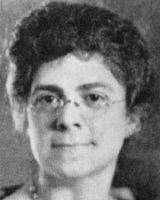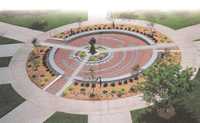
Hazel Branch
is honored with a Medium Bench from Max S. Allen, M.D., Marijean Berg, Hal Bingham, John Boyle, Frances Powers Brinegar, Julian W. Buser, Lucille Campion, Irene Box Crews, Patricia Daniel, James Denninghoff, Dr. Albert E. Fulton, Kenneth Hedrick, J.G. Kendrick, M.D., William E. Larsen, M.D., Norman Martin, M.D., James E. McIntosh, M.D., Ms. H. J. McKinley, Robert Norris, M.D., Donald Overend, Frances M. Parsons, Dr. P.J. Preston, D. Cramer Reed, M.D., Lowell M. Rhodes, M.D., Sydney Schroeder, M.D., Mildred Simmons, Robert K. Skillman, Dr. John J. Stucky, Ronald Summers, M.D., and Ernest Elwood Tippin.
 Hazel Elizabeth Branch (Ph.D. Entomology, 1921, Cornell University) was born in Concordia, KS. She came to Fairmount College in 1922 as Professor and Head of the Department of Biology and retired as Professor and Head of the Department of Zoology in 1956. Dr. Branch was an outstanding and unusual woman in that she had a clear idea of what her life's work should be, trained for it continually and extensively and pursued it with undaunted vigor, intensity and dedication.
Hazel Elizabeth Branch (Ph.D. Entomology, 1921, Cornell University) was born in Concordia, KS. She came to Fairmount College in 1922 as Professor and Head of the Department of Biology and retired as Professor and Head of the Department of Zoology in 1956. Dr. Branch was an outstanding and unusual woman in that she had a clear idea of what her life's work should be, trained for it continually and extensively and pursued it with undaunted vigor, intensity and dedication.
Through Dr. Branch's efforts, students were given the finest undergraduate education in life sciences and many went on to pursue advanced degrees. Although data is not available on all of her students, it is known that at least 197 became physicians, 56 dentists and one a phytopathologist. Her involvement with students continued long after they graduated as evidenced by the fact that she kept detailed records on the addresses and status of each person. For many years, not a week would pass without her receiving a letter, a phone call or visiting personally with a former student. Pre-college students were given opportunities and encouragement to pursue a scientific career as a result of Dr. Branch's influence in organizations such as the Wichita Science Club (an organization of local science teachers) and the Junior Committee of the Kansas Academy of Science.
Dr. Branch was contemporaneously recognized, respected and honored. The 1926 Parnassus, dedicated to her, lauded her "efficient services and inspirational life since coming to Fairmount;" her "willing helpfulness, beautiful personality and strength of character [which] made her known and loved to all of her students." Countless articles about Dr. Branch appeared in the campus newspaper, The Sunflower. She was a "tireless worker" in the campaign for the Municipal University of Wichita.
Although she was apparently a devoutly religious woman, she did not compromise the intellectual principles of her chosen field. Many of her research projects focused on preventative medicine, such as demonstrating the need for a balanced diet and the effects of alcohol and nicotine usage on human health. She was a popular and frequent speaker for many local civic organizations such as the Twentieth Century Club and the YWCA.
Not one to shirk social responsibilities she served at many teas for students and their parents; in the 1940s she sponsored the Pi Kappa Psi sorority. In 1938 Dr. Branch's biography was included in "Men of Science." Some of her more prestigious organizational affiliations included: Phi Beta Kappa, American Society of Zoologists and Parasitologists, American Academy for the Advancement of Science (Fellow), Kansas Academy of Science (President), and American Association of University Professors (President, Wichita Chapter).
In 1957 Dr. Branch was awarded the Alumni Recognition Award and upon her death in 1973 a memorial fund - The Hazel E. Branch Scholarship in Life Sciences - was established with the WSU Board of Trustees. Although her life was characterized by total dedication to teaching, scientific research and community service, her gifts as a teacher reign paramount. She set an example, by virtue of her sincere interest in the well being of her students, of the importance of working hard and with distinction for all the right reasons.
One of her students recently wrote: "Throughout my time at WU as a pre-med major, I always thought of Dr. Branch as a friend as well as a teacher and mentor. She was a strong proponent of the work ethic, a dedicated perfectionist, and literally radiated the excitement of the scientific approach. She could be kind and gentle and at the same time stern and demanding. She was fair to a fault with her students; there were no pampered favorites in her classes. We shared a common religious background, both being members of St. James Episcopal Church. One of my treasured memories was her yearly lecture reconciling the Christian teachings and the theory of evolution. She saw no conflict in these thought systems and clearly delineated their parallel nature. I only wish she had written down this lecture; it would help dispel the schism between the Creationists and the Evolutionists."
September 16, 1998










